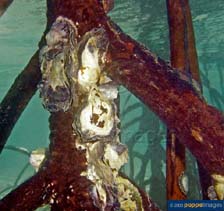Saccostrea cuccullata (Born, 1778)
Hooded oyster
Classification / Names Populärnamn | synonymer | CoL | ITIS | WoRMS
Bivalvia | Ostreida | Ostreidae
Environment: milieu / climate zone / djupintervall / distribution range Ekologi
; djupintervall 0 - 5 m (Ref. 348). Tropical; 45°N - 42°S, 8°E - 133°W
Distribution Länder | FAO områden | Ekosystem | Förekomster | Utplanteringar
Indo-Pacific and Eastern Atlantic. Introduced in the Mediterranean.
Length at first maturity / Size / Weight / Age
Könsmognad: Lm ? range ? - ? cm Max length : 20.0 cm SHL hane/ej könsbestämd; (Ref. 348); common length : 10.0 cm SHL hane/ej könsbestämd; (Ref. 348)
Life cycle and mating behavior Könsmognad | Reproduktion | Lek | Eggs | Fecundity | Larvae
Main reference
referenser | Koordinator | Medarbetare
Poutiers, J.M. 1998 Bivalves. Acephala, Lamellibranchia, Pelecypoda. p. 123-362. In Carpenter, K. E. and V. H. Niem. 1998. FAO species identification guide for fishery purposes. The living marine resources of the Western Central Pacific. Volume 1. Seaweeds, corals, bivalves, and gastropods. Rome, FAO. (Ref. 348)
IUCN Red List Status
(Ref. 130435: Version 2025-1)
CITES status (Ref. 108899)
CMS (Ref. 116361)
Threat to humans
Human uses
Fiskeri: kommersiell
FAO - Vattenbruk: production; | FishSource | Sea Around Us
Verktyg
Ytterligare information
Max. ages / sizes
Length-weight rel.
Length-length rel.
Length-frequencies
Mass conversion
Abundans
Internet-källor
BHL | BOLD Systems | CISTI | DiscoverLife | FAO(; publication : search) | Fishipedia | GenBank (genome, nucleotide) | GloBI | Gomexsi | Google Books | Google Scholar | Google | PubMed | Tree of Life | Wikipedia (Go, sök) | Zoological Record



